学霸英语新概念第三册语法详解和总结(带习题和答案)
新概念第三册语法总结
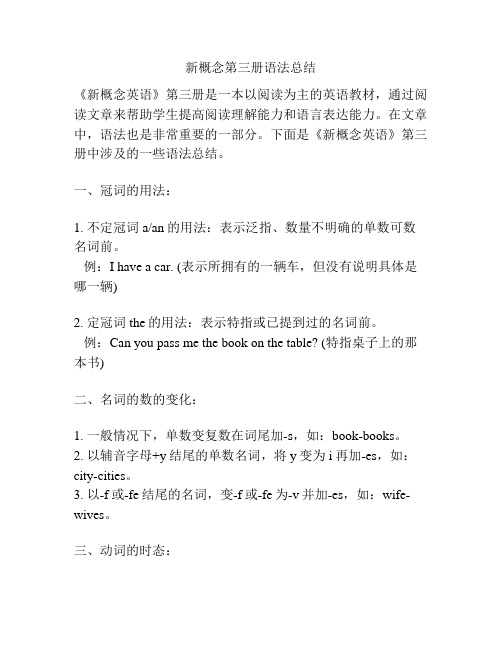
新概念第三册语法总结《新概念英语》第三册是一本以阅读为主的英语教材,通过阅读文章来帮助学生提高阅读理解能力和语言表达能力。
在文章中,语法也是非常重要的一部分。
下面是《新概念英语》第三册中涉及的一些语法总结。
一、冠词的用法:1. 不定冠词a/an的用法:表示泛指、数量不明确的单数可数名词前。
例:I have a car. (表示所拥有的一辆车,但没有说明具体是哪一辆)2. 定冠词the的用法:表示特指或已提到过的名词前。
例:Can you pass me the book on the table? (特指桌子上的那本书)二、名词的数的变化:1. 一般情况下,单数变复数在词尾加-s,如:book-books。
2. 以辅音字母+y结尾的单数名词,将y变为i再加-es,如:city-cities。
3. 以-f或-fe结尾的名词,变-f或-fe为-v并加-es,如:wife-wives。
三、动词的时态:1. 一般现在时:表示习惯性、经常性或客观真理等。
例:Water boils at 100 degrees Celsius. (客观真理)2. 一般过去时:表示过去发生或存在的动作或状态。
例:She lived in London for five years. (过去发生的动作)3. 现在进行时:表示现在正在进行的动作。
例:I am reading a book now. (正在进行的动作)4. 过去进行时:表示过去某一时间正在进行的动作。
例:He was studying when I called him. (过去某一时间正在进行的动作)5. 一般将来时:表示将来某一时间将要发生的动作。
例:I will go to the cinema tomorrow. (将来某一时间将要发生的动作)四、形容词和副词的比较等级:1. 一般形容词比较等级:例:good - better - best (好 - 更好 - 最好)2. 以-y结尾的形容词,变-y为-i,再加-er或-est:例:happy - happier - happiest (快乐 - 更快乐 - 最快乐)五、连词的用法:1. 并列连词and:用于连接并列的词、短语、从句等。
(完整word版)新概念英语第三册课后习题答案详解.docx

Lesson 01 A Puma at large逃遁的美洲狮Special difficulties点Exercises A1. at/for2. to3. to4. in5. onExercises B1.He is the man we have heard about so much.2.The shelf you put those books on has collapsed.(vi. 倒塌 , 崩 , 瓦解)3.Whom did you receive a letter from特殊疑句中whom 不能省略(本句)。
定从句中 Which 以及指代人的做的Whom, 在非正式用法当中可以省略。
省略,介不能前置到关系代 Whom, Which 前,只能用于非固定的短后面。
固定的短look for :找(去掉 for 后 look 没有找的意思,所以介 for 不能前置)非固定的短look at :注live in :居住(去掉 in 后 live 仍有居住的意思,所以介 in 可以前置)This is the old house in which he lived. = Thisis the old house he lived in.4.This is the road we came by5.Where is the pencil you were playing withMultiple choice questions 多1⋯正确答案: Din common adv.共有(替了 similar )2⋯正确答案: BA)只是一个具体的特定的事列,理解的候要把握中心大意B) large catpersuade v. 服 ,3⋯答案正确: C做理解要扣主、扣中心大意文章最后一句了大意句型构和是每的关4⋯答案正确: CMake 的用法:make somebody do(在主中不定式的符号 to 省略)be made to do(被中不定式的符号to 必充完整)-- They made her wait for hours. à She was made to wait for hours.5⋯答案正确:DA )把 say 改成 claim 就了( -- People claimedto have seen the puma).D)清楚的道明了作生的先后关系6⋯正确答案: B原句中的when 引的状从句表示:-...就⋯( as soon as)被: On being observed, it immediately ran away.主: On observing her, it immediately ran away.On seeing me, he waved to me.7⋯正确答案: Dexcept 可以和名 /名性从句行搭配(也可是when/if 引的从句形式)unless = if...not = except on the condition that ⋯when = if--⋯except when they are cornered. = ⋯ except if they are cornered.--Whenever you come, you are welcome. = If ever you come, you are welcome.8⋯正确答案: DA )must be 只是客的推,不一致-- 于去事推一定要用:情 + have +去分9⋯正确答案: Con more than = nothing more than = only / within = not more than10⋯正确答案: Bin a corner 摸摸地 , 暗中地 , 秘密地 in atrap 落于陷阱中at an angle 不正的 , 斜的( angle n.角 , 角度 , 角落 , 角 , 棱角)under cover 在遮蔽 , 秘密地 , 暗中11... 正确答案: Bfishes for pleasure 消遣travel for pleasure 外出游玩read for pleasure 消遣12⋯on one’s own adv.独自地 , 独立地 , 主地( = alone)for one’s own benefit 了某人自己的利益。
新概念3课后答案详解(全)解析
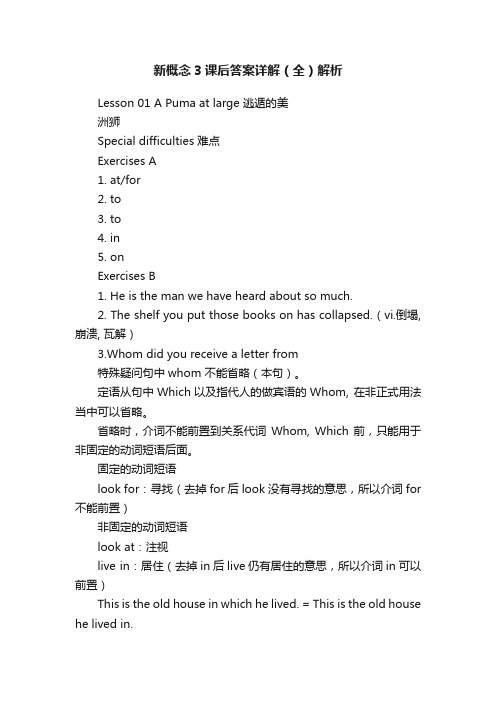
新概念3课后答案详解(全)解析Lesson 01 A Puma at large 逃遁的美洲狮Special difficulties 难点Exercises A1. at/for2. to3. to4. in5. onExercises B1. He is the man we have heard about so much.2. The shelf you put those books on has collapsed.(vi.倒塌, 崩溃, 瓦解)3.Whom did you receive a letter from特殊疑问句中whom 不能省略(本句)。
定语从句中Which以及指代人的做宾语的Whom, 在非正式用法当中可以省略。
省略时,介词不能前置到关系代词Whom, Which前,只能用于非固定的动词短语后面。
固定的动词短语look for:寻找(去掉for后look没有寻找的意思,所以介词for 不能前置)非固定的动词短语look at:注视live in:居住(去掉in后live仍有居住的意思,所以介词in可以前置)This is the old house in which he lived. = This is the old house he lived in.4.This is the road we came by5.Where is the pencil you were playing withMultiple choice questions 多项选择1…正确答案:Din common adv.共有(替换了similar)2…正确答案:BA)只是一个具体的特定的事列,阅读理解题的时候要把握中心大意B)large catpersuade v.说服, 劝说3…答案正确:C做理解题时要紧扣主题、紧扣中心大意文章最后一句话总结了大意句型结构题和词汇题是每课的关键4…答案正确:CMake的用法:make somebody do(在主动语态中不定式的符号to应该省略)be made to do(被动语态中不定式的符号to必须补充完整)-- They made he r wait for hours. àShe was made to wait for hours.5…答案正确: DA)把say改成claim就对了(-- People claimed to have seen the puma.)D)清楚的道明了动作发生的先后关系6…正确答案:B原句中的when引导的时间状语从句表示:-...就…(as soon as)被动:On being observed, it immediately ran away.主动:On observing her, it immediately ran away.On seeing me, he waved to me.7…正确答案:Dexcept可以和名词/名词性从句进行搭配(也可是when/if引导的从句形式)unless = if...not = except on the condition that…when = if-- …except when they are cornered. = …except if they are cornered.-- Whenever you come, you are welcome. = If ever you come, you are welcome.8…正确答案:DA)must be只是对客观现实的推测,时态不一致-- 对于过去事实推测一定要用:情态动词+ have +过去分词9…正确答案:Con more than = nothing more than = only / within = not more than10…正确答案:Bin a corner 偷偷摸摸地, 暗中地, 秘密地in a trap 落于陷阱中at an angle 不正的, 倾斜的(angle n.角, 角度, 角落, 墙角, 棱角)under cover 在遮蔽处, 秘密地, 暗中11... 正确答案:Bfishes for pleasure 钓鱼消遣travel for pleasure 外出游玩read for pleasure 阅读消遣12…on one’s own adv.独自地, 独立地, 主动地(= alone)for one’s own benefit 为了某人自己的利益。
《新概念英语》第三册课文详解及课后答案

《新概念英语》第三册课文详解及课后答案目录§ Lesson 1 A puma at large 逃遁的美洲狮 (1)§ Lesson 2 Thirteen equals one 十三等于一 (5)§ Lesson 3 An unknown goddess 无名女神 (8)§ Lesson 4 The double life of Alfred Bloggs阿尔弗雷德。
布洛格斯的双重生活 (12)§ Lesson 5 The facts 确切数字 (16)§ Lesson 6 Smash-and grab 砸橱窗抢劫 (19)§ Lesson 7 Mutilated ladies 残钞鉴别组 (23)§ Lesson 8 A famous monastery 著名的修道院 (26)§ Lesson 9 Flying cats 飞猫 (29)§ Lesson 10 The loss of the Titanic “泰坦尼克“号的沉没 (32)§ Lesson 11 Not guilty 无罪 (37)§ Lesson 12 Life on a desert island 荒岛生活 (41)§ Lesson 13 ‘It’s only me’ “是我,别害怕” (44)§ Lesson 14 A noble gangster 贵族歹徒 (48)§ Lesson 15 Fifty pence worth of trouble 五十便士的麻烦 (52)§ Lesson 16 Mary had a little lamb 玛丽有一头小羔羊 (56)§ Lesson 17 The longest suspension bridge in the world世界上最长的吊桥 (59)§ Lesson 18 Electric currents in modern art 现代艺术中的电流 (63)§ Lesson 19 A very dear cat 一只贵重的宝贝猫 (67)§ Lesson 20 Pioneer pilots 飞行员的先驱 (70)§ Lesson 21 Daniel Mendoza 丹尼尔.门多萨 (73)§ Lesson 22 By heart 熟记台词 (75)§ Lesson 23 One man’s meat is another man’s poison 各有所爱 (79)§ Lesson 24 A skeleton in the cupboard “家丑” (83)§ Lesson 25 The Cutty Sark“卡蒂萨克”号帆船 (87)§ Lesson 26 Wanted: a large biscuit tin 征购大饼干筒 (90)§ Lesson 27 Nothing to sell and nothing to buy 不卖也不买 (94)§ Lesson 28 Five pounds too dear 五镑太贵 (97)§ Lesson 29 Funny or not? 是否可笑? (101)§ Lesson 30 The death of a ghost 幽灵之死 (104)§ Lesson 31 A lovable eccentric 可爱的怪人 (107)§ Lesson 32 A lost ship 一艘沉船 (111)§ Lesson 33 A day to remember 难忘的一天 (114)§ Lesson 34 A happy discovery 幸运的发现 (118)§ Lesson 35 Justice was done 伸张正义 (123)§ Lesson 36 A chance in a million 百万分之一的机遇 (126)§ Lesson 37 The Westhaven Express 开往威斯特海温的快车 (129)§ Lesson 38 The first calender 最早的日历 (132)§ Lesson 39 Nothing to worry about 不必担心 (136)§ Lesson 40 Who’s who 真假难辨 (140)§ Lesson 41 Illusions of pastoral peace 宁静田园生活的遐想 (142)§ Lesson 43 Fully insured 全保险 (149)§ Lesson 44 Speed and comfort 又快捷又舒适 (152)§ Lesson 45 The power of the press 新闻报道的威力 (160)§ Lesson 46 Do it yourself 自己动手 (164)§ Lesson 47 Too high a price? 代价太高 (169)§ Lesson 48 The silent village 沉默的村庄 (174)§ Lesson 49 The ideal servant 理想的仆人 (176)§ Lesson 50 New Year resolutions 新年的决心 (178)§ Lesson 52 Mud is mud 实事求是 (183)§Lesson 53 In the public interest 为了公众的利益 (188)§ Lesson 54 Instinct or cleverness? 是本能还是机智 (192)§ Lesson 58 A spot of bother 一点儿小麻烦 (197)§ Lesson 59 Collecting 收藏 (199)§ Lesson 60 Too early and too late 太早和太晚 (205)§ Lesson 1 A puma at large 逃遁的美洲狮【New words and expressions】生词和短语◆puma n. 美洲狮◆spot v. 看出,发现◆evidence n. 证据◆accumulate v. 积累,积聚◆oblige v. 使…感到必须◆hunt n. 追猎;寻找◆blackberry n. 黑莓◆human being 人类◆corner v. 使走投无路,使陷入困境◆trail n. 一串,一系列◆print n. 印痕◆cling (clung, clung ) v. 粘◆convince v.使…信服◆somehow adv. 不知怎么搞地,不知什么原因◆disturb v. 令人不安学习词汇时仅知道汉语语义是不够的,要把单词放在语句中体会其应用;学习关键句型结构时则要把它放在段落结构或文章里★spot v. 看出,发现pick out / see / recognize / catch sight ofeg: A tall man is easy to spot in the crowd.He has good eye for spotting mistakes. 他有敏锐的识别错误的能力。
新概念英语第三册语法汇总和习题
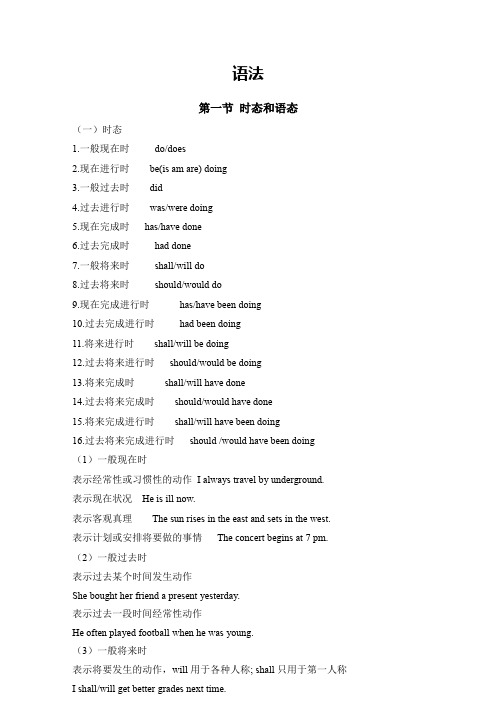
语法第一节时态和语态(一)时态1.一般现在时do/does2.现在进行时be(is am are) doing3.一般过去时did4.过去进行时was/were doing5.现在完成时has/have done6.过去完成时had done7.一般将来时shall/will do8.过去将来时should/would do9.现在完成进行时has/have been doing10.过去完成进行时had been doing11.将来进行时shall/will be doing12.过去将来进行时should/would be doing13.将来完成时shall/will have done14.过去将来完成时should/would have done15.将来完成进行时shall/will have been doing16.过去将来完成进行时should /would have been doing(1)一般现在时表示经常性或习惯性的动作I always travel by underground.表示现在状况He is ill now.表示客观真理The sun rises in the east and sets in the west.表示计划或安排将要做的事情The concert begins at 7 pm.(2)一般过去时表示过去某个时间发生动作She bought her friend a present yesterday.表示过去一段时间经常性动作He often played football when he was young.(3)一般将来时表示将要发生的动作,will用于各种人称; shall只用于第一人称I shall/will get better grades next time.Your parents will be glad to hear that you return home."am / is / are going to+动词原形”用来表示事先考虑过的将要发生的动作Jean is going to meet me at the airport.”be doing”表示根据现在计划或安排做某事I am taking Jane out of dinner tonight.be+(about) to do, 表示近期内要做的事情注意:不能与时间状语连用The new school year is about to start.难点:主将从现时间状语从句:when, whenever, since, till, once, as soon as, while, as ,before, afterI will be an English teacher when I grow up.条件状语从句:if, unless, as long as, so long asIf I have extra money, I will pay the bill for you.(4)现在进行时目前在做的动作He is studying physics very hard these days.现阶段在进行动作I hear you are writing a novel.与always, forever, constantly,continually表达有感情色彩的词汇He is forever asking silly questions like a stupid guy.(5)过去进行时过去某个时刻正在进行动作We were taking photos on the mountains.过去某段时间内的动作I was talking about the new book yesterday morning.(6)将来进行时将来某个时刻正在进行动作When I get home, my mother will be cooking dinner.计划将来要发生的事情She will be studying French at college this time next year.(7)现在完成时已经完成某事,过去的动作对现在有影响We have just e back from the United States.表示过去某一行为持续到现在,可能继续持续下去They have been best mates since school.have been to 曾去过某地,现在已经不在have gone to 已经去了某地,现在可能还在去的路上My father has been to Beijing.My father has gone to Beijing.固定句型:It is the+序数词+time that sb have/has done sth“这是某人第几次去......”It is the first time that his painting has been displayed to the public.(8)过去完成时“过去的过去”:过去某个时间开始一直延续到过去另一个时间的动作I had read half of the book by yesterday.By the time they finished the job, we had reached more.固定句型:It was the+序数词+time that sb had done sth“这是某人第几次去......”It was the second time that I had met the same kind of problem.固定句型:no sooner+过去完成时+than+一般过去时hardly+过去完成时+when+一般过去时scarcely+过去完成时+when+一般过去时“一......就......”They had no sooner reached the office than it began to rain.=They had hardly reached the office when it began to rain.=They had scarcely reached the office when it began to rain.表示过去未曾实现的愿望,与动词intend, mean, plan, hope, wish, want, think, expect 连用I had meant to e ,but something happened.(9)现在完成进行时过去某一时间开始持续到现在,并且继续持续下去I have been waiting for an hour, but he still hasn’t turned up.(10)将来完成时表示将来某时刻之前或某动作前已经发生的动作We shall/wiil have met that manager by next Monday.表示一个持续到将来某时之前或某动作发生之前的动作By next Monday, she will have studied here for three years.(11)过去完成进行时过去某个时间或动作之前一直进行的动作He had been writing this novel up to that time.(12)过去将来时:过去某事看将来要发生的动作John said he would have a rest the next day.(二)语态(1)英语语态:主动语态、被动语态He opened the door. 他打开了这扇门。
新概念英语第三册语法解析

新概念英语第三册语法解析新概念英语第三册语法解析新概念英语*短小精悍,语句幽默诙谐,语法全面系统。
今天给大家带来新概念英语第三册语法解析,希望可以帮助到大家,下面就和大家分享,来欣赏一下吧。
新概念英语第三册语法解析:类比法、夸张法、排比法类比法(Analogy)是一种词义修辞格,把两种本质上不相同的事物就其某方面的共同点进行比较,通过比喻说明某种道理或描绘某种复杂情况。
例如,Lesson 27的第一句, “It has been said that everyone lives by selling something.” 作者把人们生活工作的方式类比成销售货物的方式,每个人都是一定意义上的推售员,抽象的为谋生而付出的努力被比喻成具体的可供售卖的货物。
通过这样的类比,读者找到了联系的线索,加深对句子的理解并引起共鸣。
假如我们要借助类比描绘英语的作用,我们就可以说,“What English means to a student is what weapons mean to the soldiers who fight in the battlefield.” 或“If we obtain Engli sh proficiency, we obtain the key which leads us to more knowledge and opportunities.”夸张法(hyperbole)也是词义修辞,刻意地夸大或缩小把事物的特征,在数量,形状和程度上加以渲染,“言过其实”地使事物的本质特征更好地呈现出来,给人强烈的印象。
Lesson 49, 作者谈到阿姨家的仆人数量时提及”an army of servants (仆人大军)” and “the shifting population(流动人口)”, 把Bessie导致布丁砸在桌上的小意外说成“catastrophe (大灾难)”, 不难看出这些都是夸张的例子。
新概念英语第三册Lesson 4 知识讲解(具体、含练习及答案)
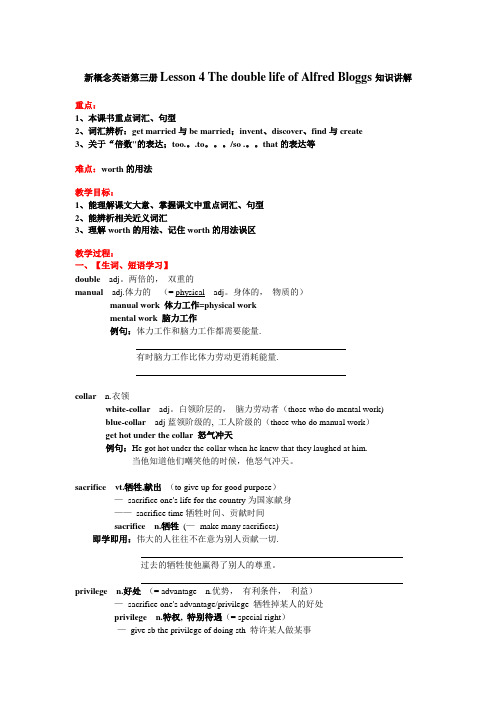
新概念英语第三册Lesson 4 The double life of Alfred Bloggs知识讲解重点:1、本课书重点词汇、句型2、词汇辨析:get married与be married;invent、discover、find与create3、关于“倍数"的表达;too.。
.to。
/so .。
that的表达等难点:worth的用法教学目标:1、能理解课文大意、掌握课文中重点词汇、句型2、能辨析相关近义词汇3、理解worth的用法、记住worth的用法误区教学过程:一、【生词、短语学习】double adj。
两倍的,双重的manual adj.体力的(= physical adj。
身体的,物质的)manual work 体力工作=physical workmental work 脑力工作例句:体力工作和脑力工作都需要能量.有时脑力工作比体力劳动更消耗能量.collar n.衣领white-collar adj。
白领阶层的,脑力劳动者(those who do mental work)blue-collar adj蓝领阶级的, 工人阶级的(those who do manual work)get hot under the collar 怒气冲天例句:He got hot under the collar when he knew that they laughed at him.当他知道他们嘲笑他的时候,他怒气冲天。
sacrifice vt.牺牲,献出(to give up for good purpose)—- sacrifice one's life for the country为国家献身——sacrifice time牺牲时间、贡献时间sacrifice n.牺牲(—- make many sacrifices)即学即用:伟大的人往往不在意为别人贡献一切.过去的牺牲使他赢得了别人的尊重。
(完整版)新概念英语第三册课后习题答案详解
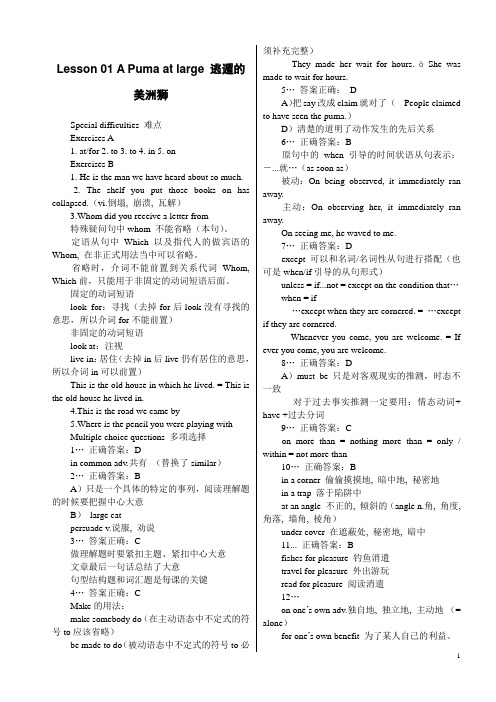
Lesson 01 A Puma at large 逃遁的美洲狮Special difficulties 难点Exercises A1. at/for2. to3. to4. in5. onExercises B1. He is the man we have heard about so much.2. The shelf you put those books on has collapsed.(vi.倒塌, 崩溃, 瓦解)3.Whom did you receive a letter from特殊疑问句中whom 不能省略(本句)。
定语从句中Which以及指代人的做宾语的Whom, 在非正式用法当中可以省略。
省略时,介词不能前置到关系代词Whom, Which前,只能用于非固定的动词短语后面。
固定的动词短语look for:寻找(去掉for后look没有寻找的意思,所以介词for不能前置)非固定的动词短语look at:注视live in:居住(去掉in后live仍有居住的意思,所以介词in可以前置)This is the old house in which he lived. = This is the old house he lived in.4.This is the road we came by5.Where is the pencil you were playing withMultiple choice questions 多项选择1…正确答案:Din common adv.共有(替换了similar)2…正确答案:BA)只是一个具体的特定的事列,阅读理解题的时候要把握中心大意B)large catpersuade v.说服, 劝说3…答案正确:C做理解题时要紧扣主题、紧扣中心大意文章最后一句话总结了大意句型结构题和词汇题是每课的关键4…答案正确:CMake的用法:make somebody do(在主动语态中不定式的符号to应该省略)be made to do(被动语态中不定式的符号to必须补充完整)-- They made her wait for hours. àShe was made to wait for hours.5…答案正确: DA)把say改成claim就对了(-- People claimed to have seen the puma.)D)清楚的道明了动作发生的先后关系6…正确答案:B原句中的when引导的时间状语从句表示:-...就…(as soon as)被动:On being observed, it immediately ran away.主动:On observing her, it immediately ran away.On seeing me, he waved to me.7…正确答案:Dexcept可以和名词/名词性从句进行搭配(也可是when/if引导的从句形式)unless = if...not = except on the condition that…when = if-- …except when they are cornered. = …except if they are cornered.-- Whenever you come, you are welcome. = If ever you come, you are welcome.8…正确答案:DA)must be只是对客观现实的推测,时态不一致-- 对于过去事实推测一定要用:情态动词+ have +过去分词9…正确答案:Con more than = nothing more than = only / within = not more than10…正确答案:Bin a corner 偷偷摸摸地, 暗中地, 秘密地in a trap 落于陷阱中at an angle 不正的, 倾斜的(angle n.角, 角度, 角落, 墙角, 棱角)under cover 在遮蔽处, 秘密地, 暗中11... 正确答案:Bfishes for pleasure 钓鱼消遣travel for pleasure 外出游玩read for pleasure 阅读消遣12…on one’s own adv.独自地, 独立地, 主动地(= alone)for one’s own benefit 为了某人自己的利益。
新概念英语第三册语法解析
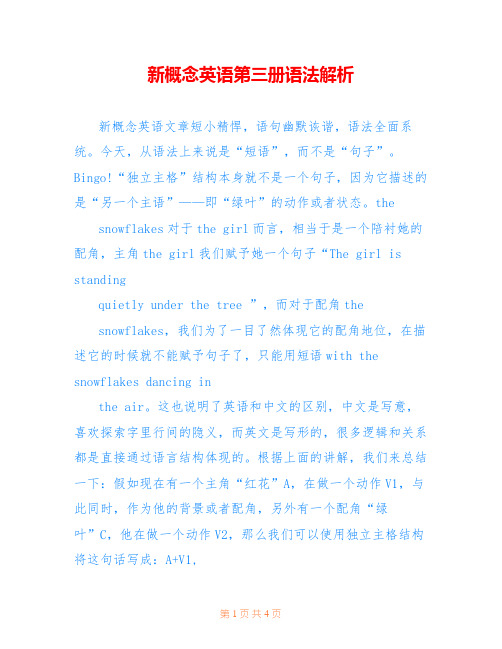
新概念英语第三册语法解析新概念英语文章短小精悍,语句幽默诙谐,语法全面系统。
今天,从语法上来说是“短语”,而不是“句子”。
Bingo!“独立主格”结构本身就不是一个句子,因为它描述的是“另一个主语”——即“绿叶”的动作或者状态。
the snowflakes对于the girl而言,相当于是一个陪衬她的配角,主角the girl我们赋予她一个句子“The girl is standingquietly under the tree ”,而对于配角thesnowflakes,我们为了一目了然体现它的配角地位,在描述它的时候就不能赋予句子了,只能用短语with the snowflakes dancing inthe air。
这也说明了英语和中文的区别,中文是写意,喜欢探索字里行间的隐义,而英文是写形的,很多逻辑和关系都是直接通过语言结构体现的。
根据上面的讲解,我们来总结一下:假如现在有一个主角“红花”A,在做一个动作V1,与此同时,作为他的背景或者配角,另外有一个配角“绿叶”C,他在做一个动作V2,那么我们可以使用独立主格结构将这句话写成:A+V1,(with) C+V2的非谓语形式(最常见的是现在分词或过去分词)。
有了公式和用法,我们再来看新概念英语三第6课中的一个句子:The silence was suddenly broken when a largecar, with its headlights on and its horn blaring, roared down thearcade.(宁静突然被打破,一辆大轿车亮着前灯,响着喇叭,呼啸着冲进了拱廊街,在珠宝店门口停了下来。
)阅读这个句子的时候,我们发现思维会卡在划横线的这个部分上,所以我们先暂时不看,先分析when引导的这个时间状语从句,whena large car…roared down thearcade,比较好理解,就是当“一辆大轿车呼啸着冲进了拱廊街”。
学霸英语新概念第三册语法详解和总结(带习题和答案)

学霸英语新概念第三册语法详解和总结(带习题和答案)第一章英语从句Subordination英语从句主要有定语从句,状语从句和名词性从句(主语从句,宾语从句,表语从句,同位语从句)一.定语从句定语从句:由关系代词who, whom, whose, that, which; 关系副词when, where, why 引导。
(下面十个句子请读5遍并脱口译出!)1. The death notices tell us about people who have died during the week.2. The man (whom) you spoke to just now is my friend.3. The building whose lights are on is beautiful.4. Please find a place which we can have a private talk in.5. The knee is the joint where the thighbone meets the large bone of the lower leg.6. He still remembers the day when he went to school.7. It is no need telling us the reason why you didn't finish it in time.8. He has three sons, two of whom died in the war.9. Mr. Smith, whose wife is a clerk, teaches us English.10. In the Sunday paper there are comics, which children enjoy.只能用that和who引导的定语从句A.all, nothing, anything, a few, one做先行词指物时B.先行词前有形容词最高级修饰时,后面常跟that而不是which.C.先行词前有the only, the first, the last, the next, the very等词修饰时,引导词只能用that。
新概念英语第三册语法解析汇总
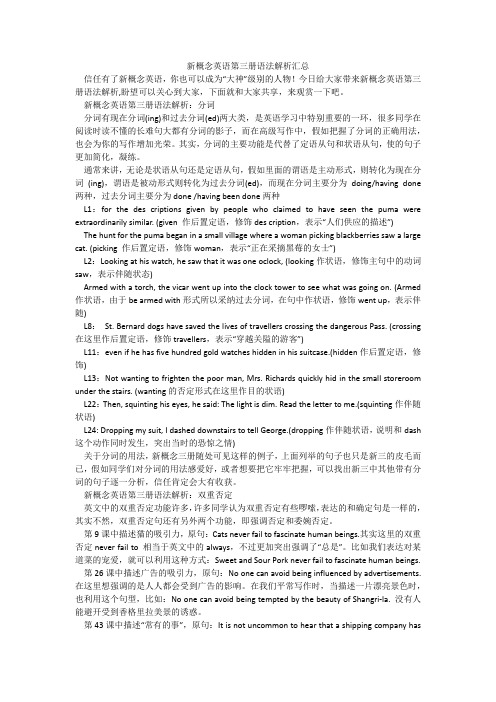
新概念英语第三册语法解析汇总信任有了新概念英语,你也可以成为“大神”级别的人物!今日给大家带来新概念英语第三册语法解析,盼望可以关心到大家,下面就和大家共享,来观赏一下吧。
新概念英语第三册语法解析:分词分词有现在分词(ing)和过去分词(ed)两大类,是英语学习中特别重要的一环,很多同学在阅读时读不懂的长难句大都有分词的影子,而在高级写作中,假如把握了分词的正确用法,也会为你的写作增加光荣。
其实,分词的主要功能是代替了定语从句和状语从句,使的句子更加简化,凝练。
通常来讲,无论是状语从句还是定语从句,假如里面的谓语是主动形式,则转化为现在分词(ing),谓语是被动形式则转化为过去分词(ed),而现在分词主要分为doing/having done 两种,过去分词主要分为done /having been done两种L1:for the des criptions given by people who claimed to have seen the puma were extraordinarily similar. (given 作后置定语,修饰des cription,表示“人们供应的描述”)The hunt for the puma began in a small village where a woman picking blackberries saw a large cat. (picking 作后置定语,修饰woman,表示“正在采摘黑莓的女士”)L2:Looking at his watch, he saw that it was one oclock, (looking作状语,修饰主句中的动词saw,表示伴随状态)Armed with a torch, the vicar went up into the clock tower to see what was going on. (Armed 作状语,由于be armed with形式所以采纳过去分词,在句中作状语,修饰went up,表示伴随)L8:St. Bernard dogs have saved the lives of travellers crossing the dangerous Pass. (crossing 在这里作后置定语,修饰travellers,表示“穿越关隘的游客”)L11:even if he has five hundred gold watches hidden in his suitcase.(hidden作后置定语,修饰)L13:Not wanting to frighten the poor man, Mrs. Richards quickly hid in the small storeroom under the stairs. (wanting的否定形式在这里作目的状语)L22:Then, squinting his eyes, he said: The light is dim. Read the letter to me.(squinting作伴随状语)L24: Dropping my suit, I dashed downstairs to tell George.(dropping作伴随状语,说明和dash 这个动作同时发生,突出当时的恐惊之情)关于分词的用法,新概念三册随处可见这样的例子,上面列举的句子也只是新三的皮毛而已,假如同学们对分词的用法感爱好,或者想要把它牢牢把握,可以找出新三中其他带有分词的句子逐一分析,信任肯定会大有收获。
新概念英语第三册语法

新概念英语第三册语法新概念英语第三册语法精讲及练习<二>:虚拟语气摘要:新概念英语第三册语法精讲及练习.虚拟语气用来表达不可能或难以实现的愿望,与事实相反的假设,通常分为基本的三种形式.新概念英语第三册语法精讲及练习虚拟语气用来表达不可能或难以实现的愿望,与事实相反的假设,通常分为基本的三种形式.1. 与现在事实相反的虚拟:If + did / were + ..., ... wouldshouldcould + do <动词原形>mightIf I were you, I would go abroad at once. <I am not you.> If he knew it now, he could help me. <He doesn't know it now.>2. 与过去事实相反的虚拟:If + had done + ..., ... would <might> have done ...If I had known your telephone number yesterday, I would have phoned you.<I didn't know your telephone number.>If you had come here a littleearlier just now, you might have met her.<You didn't come here earlier.>3. 与将来事实相反的虚拟:<1> If + should + v., ... would + v.<可能性很小><译作"万一">If it should rain tomorrow, you could stay at home.If I should fail, what should Ido?<2> If + did / were to + v ..., would + v.<完全不可能>If the sun were to rise in the west, I would lend you themoney.If you finished it in 3 minutes, I would give you my car.4. 金牌特殊重点:!![简单联想记忆]:● 下列动词后的"宾语从句"中需要用虚拟形式,即should + 动词原形,shoud在美国英语中要省略<TOEFL语法考点>.此类常见的动词有:order, ask, decide, demand, require, recommend, suggest<建议>insist<坚决要求>,advise, etc.例句:He suggested that we <should> help them with English.The teacher ordered that the homework <should> be finished within half an hour.● 下列名词后的同位语从句中要用"should + 动词原形"<should可省去>的虚拟.suggestion, order, request, demand, importance, proposal.He made a suggestion that we <should> have a fancy dress party.I think it is a thing of importance that it <should> be done soon.● It is / was important / necessary / natural / essential / advisable / strange / surprising, ect. + that +主语+ should + v.It is strange that you should say such a thing.It was important that you should tell me all the information.● wish后的宾语从句中,as if 后的状语从句中,须用下列的虚拟形式:主 + wish+ <that> + 主 + did / were<指现在>haddone<指过去>would+ v.<指将来>Iwishthat I met my uncle now.IwishI had met my uncle yesterday.IwishI could meet my uncle tomorrow.测试精编:选择正确选项:1. I ________ he had taught me the word, but he didn't.A. believeB. hopeC. wishD. think2. The man in charge recommends that this matter ________ at the meeting.A. would be discussedB. will be discussedC. be discussedD. may be discussed3. It is raining now, otherwise we ________ go out play.A. couldB. canC. mayD. will4. ________ he come late, give him the message.A. HadB. ShouldC. WouldD. Did5. Hadn't my car broke down, I ________ the train.A. would have caughtB. might catchC. could catchD. would catch6. I would have helped him if I had time, but I ________.A. haven'tB. hadC. didn'tD. wouldn't7. The dam was built in time to protect the inhabitants from the flood; ________.A. otherwise the damage would be beyond measure.B. the damage, otherwise, should be very great.C. the damage could have been very serious otherwise.D. the damage caused, therefore, many of them homeless.8. It is natural that an employee ________ his work on time.A. finishesB. finishC. can finishD. finishs9. I would go abroad but that I ________ poor.A. amB. wasC. shall beD. were10. Don't act as if you ________ the only pebble on the beach.A. areB. wereC. have beenD. would be1. C2. C3.A4. B5.A6. C7. C8. B9.A 10. B新概念英语第三册语法精讲及练习<三>:代替与省略摘要:新概念英语第三册语法精讲及练习.英语中,为了避免不必要的重复,经常用so, not, to, do, does 代替前面出现的动词或相关内容新概念英语第三册语法精讲及练习英语中,为了避免不必要的重复,经常用so, not, to, do, does 代替前面出现的动词或相关内容.如:He translated the article better than I did. <did代替wrote it>— Doyou think she isclever?— I think so. <so代替 she is clever><1> 从上两例中看出,do / does / did 代替动词.<2> "so 与 not" 代替某个词、短语、句子等,通常用于hope, think, believe, expect, suppose, be afraid, fear, imagine, etc 后作宾语.E.g. — Is it correct?— I'm afraid not. <not correct><3> "to" 用作不定式,常跟随下列动词:want, mean, hope, expect, refuse, seem, intend, be, afraid, etc.E.g. I asked him to go to the party, but he refused to. <go to the party><4> "do so, do that, do it" 用来代替动态动词,而不能代静态动词.Eg. — He gave up studying English.— Why did he do so? <= give up studying English>— The dish tastes nice.— Yes, so it does. <tastes nice><此句不能用it does it 或 it does so, 因taste属静态动词.><5> 为使语言精炼,避免不必要的重复,对话中常用省略形式.E.g. — He is thinking of buying a car?— Is he?<这里,"thinking of buying a car"被省略了.>— Will he come back in time?— Perhaps.<省略了he will come back in time.>测试精编:1. — Shall I wake you up tomorrow? — Yes, ________ .A. please doB. you shallC. you willD. you may2. I think records are often ________ an actual performance.A. as good as or better thanB. as good or better thanC. like good or better thanD. as good as any other3. —If he doesn't come to work, he may be fired. —Surely he isn't so foolish ________ not to realize that.A. soB. andC. butD. as4. — Don't you think Alan's health has beenruined by smoking? — Yes, he told me ________ himself.A. the factB. this thingC. ItD. so5. — Will you go home tomorrowevening? — No, I'm going to a lecture, or at least, I'm planning ________ .A. onB. toC. soD. It6. — I slipped on the stairs, I think my arm is broken. — Oh! I ________ .A. do not hope soB. do not hopeC. hope not soD. hope not7. California relies mainly on income from fruit crops, and ________ .A. Florida alsoB. Florida tooC. Florida is as wellD. so does Florida8. — Have you been here long? — ________ .A. No, not veryB. Not muchC. Yes, only littleD. No, only yesterday9. — You look happy today, Mary. — I like my new dress and mother ________, too.A. doesB. likesC. isD. do10. — So you are lost, little boy. Why didn't you hang on to your mother's skirt?— ________, but I couldn't reach it.A. I hanged toB. I did toC. I didn't hang toD. I tried toKey:1.A2.A3. D4.D5. B6. D7. D8.A9.A 10.D摘要:新概念英语第三册语法精讲及练习.根据语法要求,把谓语动词置于主语前,称为完全倒装,把助动词或情态动词置于主语前,称为部分倒装.新概念英语第三册语法精讲及练习倒装根据语法要求,把谓语动词置于主语前,称为完全倒装,把助动词或情态动词置于主语前,称为部分倒装.1.副词如:in, out, down, there, here, off, over, away, etc. 句子倒装.<完全倒装,但主语不能是代词>Down jumped the murderer from the tenth floor.In came Miss Green.<特别注意:当主语是人称代词时不倒装.>Away she went!<她走了!>Here you are!<你在这儿!>2.only + 副词<介词短语>位于句首,句子要倒装.Only then did he realize that he was mistaken.Only by working hard can we succeed in doing anything.3.well, so, often, such, few, little 放于句首,句子形成倒装.So fine was the weather that we all went out lying in thesun.Well did I know him and well did he know me.4.否定词或具有否定意义的词及词组用在句首时,句子须倒装.此类词有: neither,nor,hardly,scarcely,rarely,seldom,not,never,not only,barely,at no time,nowhere 等.e.g. — Jack could not swim.— Neither could Tom.Never have I seen such a good movie.5.as引导让步状语从句,须倒装.<准确地说,是将需要强调的词提到as的前面.>Rich as he is, he spends a cent on charity.Try as he does, he never seems able to do the work beautifully.6.在表示祝愿的句子中.May you make greater progress! <愿你取得更大进步!>7.在虚拟条件句中,连词if省略时,句型要倒装,即将were, had, should等词提到句首.Were I you, I would go abroad to take advanced study.我要是你,就出国进修了.Should he come tomorrow, he would help us to settle the problem.他要是明天来的话,他会帮我们解决这个问题的.8.百分特例重点:Much as we may pride ourselves on our good taste, we are no longer free to choose the things we want.<NCE Book III Lesson 26>尽管我们为自己的绝好鉴赏力感到自豪,但我们已经无法自由地选择我们所需要的东西了1. Not until the mid-nineteenth-century discovery of vast deposits of borate's in the Majave Desert ________ relativelyA. borax becameB. did borax becomeC. and borax becomeD. borax's becoming2. ________ received law degrees as today.A. Never so many women haveB. Never have so many womenC. The women aren't everD. Women who have never3. ________ the Bob's belongings that he carried them ina bundle slung over his shoulders.A. Were so fewB. Few were soC. So few wereD. They were so few4. Only after a baby seal is pushed into the sea by its mother ________ to swim.A. how will it learnB. will it learn howC. it will learn howD. and it learns how5. Not only ________ a promise, but he also kept it.A. did he madeB. he madeC. did he makeD. he makes6. Nowhere in the world ________ .A. travelers can buy so much beauty for so little as in Hawaii.B. no one can buy so much beauty for so little money as Hawaii.C. so much beauty can be bought for so little money in Hawaii.D. can travelers buy so much beauty for so little money as in Hawaii.7. No sooner ________ gone home than it began to rainA. had IB. have IC. I hadD. I have8. Not for a moment ________ the truth of your story.A. he has doubtedB. he doubtsC. did he doubtD. he did doubt9. ________ succeed in doing anything.A. Only by working hard we canB. By only working hard we canC. Only by working hard can weD. Only we can work hard10. Never before in similar circumstances ________ .A. a British Prime Minister had refused to step down.B. did a British Prime Minister have refused to step down.C. a British Prime Minister did have refused to step down.D. had a British Prime Minister refused to step down.1. B2. B3. C4. B5. C6. D7.A8.C9. C 10. D新概念英语第三册语法精讲及练习形容词定义:形容词是用来修饰名词的词,描述名词的性质、外观、特点等.功能:形容词可以做定语、表语或补助语.分类:主要分为两类:描绘性形容词和限定性形容词.● 描绘性形容词主要用来描绘大、小、新旧、颜色、质量等.● 限定性形容词主要用来限定所修饰词的数量、距离及X围所属等.1.当形容词修饰单数可数名词时,必须与冠词连用:a lovely girl, the naughty boy2.形容词可与系动词连用,做表语,说明主语的性状.常用系动词有:be,become,seem,appear,feel,look,taste,smell,sound, remain,go,turn,keep,stay, etc.The dish tastes delicious.The music sounds sweet.The milk went bad.小心陷阱 feel,smell,taste,look,keep有时可以用作实义动词,并可以用副词修饰.He looked me up and down carefully.I tasted the soup slowly to see whether it was salty.3.形容词用作后置定语.<简单理解:一般的形容词修饰名词时放在名词前面,但有些形容词修饰名词时放在名词的后面>a river navigable<一条可通航的河>sight visible可见的景象person responsible<负责人>注意:responsible person<有责任心的人>the best way possible<尽可能好的办法>the number necessary<必要的数量>the people present<在场的人>4.只能作表语的形容词1.某些表示健康状况的形容词.well<身体好的>,ill<病的>,faint<虚弱的>,poorly<身体不好的>示例:His mother has been ill for a long time.特别注意:sick是个特例.它既可做表语,又可做定语.He is sick for a couple of days.<他病两三天了>He is a sick person.<他是个病人.>2.某些以 a-开头的形容词.如:afraid<害怕的>,alone<独自的>,alive<活着的>,asleep<睡着的>,awake<醒着的>,aware<意识到的>The old man is alone in the house.<老人一个人在家.>The teacher is alive with enthusiasm.<这位老师热情洋溢.> He is asleep in his mother's arms.<他在母亲的怀抱中睡着了.>I have been aware of the difficulty.<我已经意识到了困难.>. The Chinese food served in American restaurant is not bad but I prefer ________.A. Chinese food authenticallyB. Chinese authentic foodC. food Chinese authenticallyD. authentic Chinese food2. ________ lessons were not difficult.A. Our first few short EnglishB. Our few first short EnglishC. Our few first English shortD. Few our first English short3. — Do you think that the Labor bill will be passed? —Oh, yes, it's ________ that it will.A. almost surelyB. very likelyC. near positiveD. quite certainly4. — Have you traveled much? — No, I have done ________ traveling.A. fewB. littleC. smallD. less5. —I was very busy. —Did you really work hard ________?A. all dayB. all the dayC. all the day longD. all of day long6. —Do you need anything from the store? — ________ and some cheddar cheese.A. Only a French bread loafB. A French bread loaf onlyC. Only a loaf of French breadD. A loaf of French bread only7. According to the information, the newly-constructed highway is said to be ________.A. lengthy twenty milesB. length about twenty milesC. about twenty miles longD. in twenty miles of length8. Mr. Smith has done ________ business here.A. a lot ofB. a number ofC. muchD. lots9. —Are you helping to organize the political convention? — I'm in charge of welcoming the ________.A. out-of-town visitorsB. visitors from outside of townC. visitors out-of-townD. outside town visitors10. — Does Jane have brown hair? — Yes, In fact, it's quitesimilar in shape ________ yours.A. asB. withC. likeD. to1.D2.A3. B4. B5.A6. C7.C8.A9.A 10.D新概念英语第三册语法:反意疑问句摘要:新概念英语第三册语法:反意疑问句1.一般用法:He is a student, isn't he?He isn't a student, is he?<1> "have to, had better, used to"要用下列方式反问:He has to finish the work, doesn't he?They used to smoke, didn't / usedn't they?You'd better get up immediately, hadn't you?<2> "has, have"作为助动词和实意动词,反问形式不同.We have done all the work, haven't we?You have some time, don't you?2. "seldom, barely, hardly, scarcely, few, little" 语意本身是否定,因此反意问句应为肯定形式.She seldom comes to visit us, does she?He hardly knew it, did he?3.当主句为祈使句,反意问句提出要求,命令应用 "will you"Do it at once, will you?但如表示邀请,劝告,反意问句用 "won't you"Have a cup of tea, won't you?4.否定祈使句应用 "will you" 来反问.Don't open the window, will you?5. "Let's" 短语● 当其为肯定形式,"shall we" 提出反问Let's play basketball, shall we?● 当其为否定形式,"all right, ok" 提出反问Let's not go to the party, all right?● 如为 "let us ..." 其反问形式应为 "will you" 提出请求Let us go home, will you?6.当 "think, suppose, consider, believe" etc 被用作为主句谓语动词,其后带有宾语从句时,反意疑问问句应与从句保持一致.I don't think that he is an honest man, is he?许多句子在描述一个人或一件物品时往往会出现一系列修饰语;动词的修饰语, 即副词往往也会几个同时使用,构成平行结构,平行结构要求语法结构须保持一致,如:1.系列动词:After school, we sang, danced and played the piano in the classroom.2.系列形容词:She is slim, tall, blond and beautiful.3.系列副词:The students are listening to me carefully and eagerly.平行结构不仅包括动词,形容词,副词,也包括分词,不定式,动名词,名词短语和句子等的平行用法,务必提高辨别力.易混淆的动词1. rise,raise,arise,arouse"rise" 是不及物动词,过去式为rose,过去分词为risen,其基本词义"上升,上涨".The sun rises in the east.A good idea rose in my mind. "raise" 是及物规那么动词,"举起,提高".He raised his voice to make himself heard.The boy can raise the heavy stone."arise",是不及物动词,过去式为arose,过去分词arisen,其语义为"出现,发生" .His curiosity arose due to the question his mother asked."arouse"是及物动词,过去式和过去分词为aroused,其语义为"唤醒,引起"arouse somebody from sleep 把某人唤醒arouse suspicion 引起怀疑2. lay,lie,lie"lay"及物动词,"放置,生蛋",过去式与过去分词为 "laid"I've laid the book on the self.The hen lays an egg every day."lie"不及物动词"位于,平躺",过去式为"lay"过去分词 "lain"He lay on the floor and slept soundly.Beijing lies in the north of China."lie"及物动词"说谎",它是规那么动词.He lied to his teacher.3. sit,seat"sit"不及物动词,过去式与过去分词均为 "sat".He sat in the classroom reading newspaper."seat"及物动词,"使就坐""容纳".He seats himself here.He is seated there.He seats the baby on his knees.The hall will seat 5000 people.4. affect,effect"affect" 及物动词,"对……有影响,感动,触及"The relations between then will be affected."effect" 及物动词, "导致,造成,带来〔变化〕,产生"The changes in methods effected some improvement in his study.5. hang <hanged, hanged> / <hung, hung>当 hang过去式与过去分词为 "hanged",其含义是"绞死";而当hang的过去式与过去分词为"hung"时,其含义是"悬挂".The man was hanged for murder.He hung his coat on the hook.6. borrow,lend"borrow"借入 "borrow sth. from ...""lend"<lent, lent> 借出 "lend sb. sth" 或 "lend sth. to sb."7. take,bring,fetch"take"<took, taken> 及物动词"拿走""bring"<brought, brought> 及物动词"带走""fetch" 及物动词"去取回来"1. receive,accept"receive" 客观上收到"accept" 主观上愿意接受I received his gift, but I wouldn't like to accept it.2. fit, suit"适合""fit" 指"尺寸"的适合"suit" 指"款式,花样等"的适合The dress doesn't fit me. It is too long.Blue is the color that suits her well.3. answer, reply "回答""answer" — vt."reply" — vi 须和 "to"连用"You needn't know it." He answered.So far, they haven't answered / replied to our questions.4. spend, cost, take "花费""spend" <spent, spent> 花"时间,金钱"主语须是人.He spend 5 hours writing the article."cost" <cost, cost> 花费"金钱,时间,劳力"可接双宾,主语须是"物".The book cost me $20 and 2 days."take" 通常指花"时间"主语须是"某种事情".It takes me 20 minuter to go to school.The work took me longer than I expected.5. assure,ensure"assure" 使放心 assure sb. of sth.assure sb. that...I can assure you of my honesty."ensure" 保证 ensure sth.〔其后不能接人称〕ensure thatensure doing sth.I can ensure his safety.He ensured that he finished the job in time.He ensured coming back later.百分重点:如ensure 含义为"保护,使安全",其结构为:ensure sb from / against sth.He ensured the boy from drowning.6. beat, defeat, win — vt."beat" <beat, beaten> 战胜,打败比赛,辩论中的对手He beat John at chess yesterday."defeat""击败"敌军,入侵者,整个球队They defeated the enemy in that battle."win" <won, won>"赢得比赛"win over sb.〔赢了某人〕The football team won the match.7. damage,destroy,hurt,spoil,wound,injure以上六个词中,"hurt" 可作及物,不及物动词外,其余五个均为及物动词."damage" ——损坏〔害〕〔有修复的可能性〕"destroy" ——摧毁,打破〔希望,计划〕毁灭〔无修复的可能性〕"hurt" ——伤害〔感情或身体某一部位〕痛疼"spoil" ——破坏,糟蹋〔晚会,旅游,参观等〕宠爱,惯怀〔孩子〕"wound" ——使受伤〔枪伤,刀伤〕"injure" ——使受伤Don't spoil your son too much.The man has destroyed the girl's life all her hopes.Some houses were damaged in the earthquake.I don't mean to hurt you.He was injured in the accident.It was dangerous because he was wounded seriously in the war测试精编1. His newly-published novel is quite a success ________a good income from the reading public.A. ensuring himB. assuring himC. assuring him ofD. assuring him about2. My watch ________ five o'clock.A. saysB. tellsC. speaksD. talks3. "He has been working very hard recently." "Because the burden of a big family has been ________ on his shoulder."A. bearB. borneC. bornD. bore4. The visiting delegates were urged to ________.A. talk at libertyB. state their open mindsC. make individual expressionsD. speak freelyKEYS1.C2.A3. B4.D代替与省略英语中,为了避免不必要的重复,经常用so, not, to, do, does 代替前面出现的动词或相关内容.<1> 从上两例中看出,do / does / did 代替动词.He translated the article better than I did. 〔did代替wrote it〕— Do you think she is clever?— I think so. 〔so代替 she is clever〕<2> "so与not" 代替某个词、短语、句子等,通常用于hope, think, believe, expect, suppose, be afraid, fear, imagine, etc 后作宾语.— Is it correct?— I'm afraid not. <not correct><3> "to" 用作不定式,常跟随下列动词:want, mean, hope, expect, refuse, seem, intend, be, afraid, etc.I asked him to go to the party, but he refused to. <go to the party><4> "do so, do that, do it" 用来代替动态动词,而不能代静态动词.— He gave up studying English.— Why did he do so? <= give up studying English>— The dish tastes nice.— Yes, so it does. <tastes nice>〔此句不能用it does it 或 it does so, 因taste属静态动词.〕<5> 为使语言精炼,避免不必要的重复,对话中常用省略形式.— He is thinking of buying a car?— Is he? 〔这里,"thinking of buying a car"被省略了.〕— Will he come back in time?— Perhaps. 〔省略了he will come back in time现在完成时:1.构成:have / has + 过去分词2.功能:〔1〕表示过去所发生的动作对现在的影响或产生的结果.常与yet, just, before, recently, lately〔最近〕, ever, never等表时间的副词搭配使用.He hasn't seen her lately.I haven't finished the book yet.〔2〕表示一个从过去某个时间开始,延续到现在并可能持续下去的动作,常与表示一段时间的时间状语连用.如:so far〔迄今为止〕, up till now〔直到现在〕, since, for a long time〔很长时间〕, up to present〔直到现在〕, in the past / in the last few years 〔在过去的几年里〕, these days〔目前〕……He has worked here for 15 years.I have studied English since I came here.The foreigner has been away from China for a long time.So far, I haven't received a single letter from my brother.〔3〕某些非延续性动词〔即:动作开始便终止的动词〕,在现在完成时中不能与表示一段时间状语搭配.黄金要点:I.常见的非延续动词:die, arrive〔到达〕, join〔加入〕, leave 〔离开〕, go, refuse〔拒绝〕, fail〔失败〕, finish, buy, marry, divorce〔离婚〕, awake〔醒〕, buy, borrow, lend ... 〔背三遍!〕II.这类动词并非不能用现在完成时,而是不能接常由for引导的时间状语.III.但若是用在否定句中,非延续动词的现在完成时可以与表示一段时间的状语连用.She has gone away for a month.〔误〕She has been away for a month 〔正〕The man has died for two years.〔误〕The man has been dead for two years.〔正〕How long have youbought the book?〔误〕How long have you got the book.〔正〕〔4〕注意 since的用法:They haven't had any trouble since they came here.It has been ten years since we met last time.He has been here since 1980.He has been here since ten years ago.几组对比:He has gone to Shanghai. 他到##去了.He has been to Shanghai. 他去过##.She has gone. 她已走了.She is gone. 她缺席了.〔或者她死了.〕The door has been closed. 门关上了.〔动作〕The door is closed. 门是关着的.〔状态〕测试精编1. The prices ________ going up all the time in the past few years.A. keepB. keptC. have keptD. are keeping2. For the whole period of two months, there ________ no rain in this area.A. isB. will beC. has beenD. have been3. Today is Jane's wedding day. She ________ John.A. have just married withB. was just married toC. has just been married toD. just has been married to4. No wonder the flower have withered, they ________ any water for ages.A. hadn'tB. haven'tC. haven't hadD. hadn't had5. Nowadays computer ________ a wide application with the development of production and science.A. foundB. has foundC. findsD. had foundKEYS1. C2. C3. C4. C5. B虚拟语气用来表达不可能或难以实现的愿望,与事实相反的假设,通常分为基本的三种形式.1. 与现在事实相反的虚拟:If + did / were + ..., ... would/ should/ could/ might + do 〔动词原形〕If I were you, I would go abroad at once. <I am not you.> If he knew it now, he could help me. <He doesn't know it now.>2. 与过去事实相反的虚拟:If + had done + ..., ... would <might> have done ...If I had known your telephone number yesterday, I would have phoned you. <I didn't know your telephone number.> If you had come here a little earlier just now, you might have met her. <You didn't come here earlier.>3. 与将来事实相反的虚拟:<1> If + should + v., ... would + v. 〔可能性很小〕〔译作"万一"〕If it should rain tomorrow, you could stay at home.If I should fail, what should Ido?<2> If + did / were to + v ..., would + v. 〔完全不可能〕If the sun were to rise in the west, I would lend you the money.If you finished it in 3 minutes, I would give you my car.[简单联想记忆]:下列动词后的"宾语从句"中需要用虚拟形式,即should + 动词原形,shoud在美国英语中要省略〔TOEFL语法考点〕.此类常见的动词有:order, ask, decide, demand, require, recommend, suggest 〔建议〕, insist〔坚决要求〕, advise, etc.He suggested that we <should> help them with English.The teacher ordered that the homework <should> be finished within half an hour.下列名词后的同位语从句中要用"should + 动词原形"〔should 可省去〕的虚拟.此类常见的名词有:suggestion, order, request, demand, importance, proposal.He made a suggestion that we <should> have a fancy dress party.I think it is a thing of importance that it <should> be done soon.It is / was important / necessary / natural / essential / advisable / strange / surprising, ect. + that +主语+ should + v.It is strange that you should say such a thing.It was important that you should tell me all the information.wish后的宾语从句中,as if 后的状语从句中,须用下列的虚拟形式:主 + wish+ <that> + 主 + did / were〔指现在〕had done〔指过去〕would+ v.〔指将来〕I wish that I met my uncle now.I wish I had met my uncle yesterday.I wish I could meet my uncle tomorrow.It is <high> time that ... + did / were ...It is time that you went to bed.would rather that ... + did / were ...I would rather that you were not here now.would sooner that ... + did / were ...I would sooner that you got up earlier.I would sooner that you were not my brother独立主格结构此独立形式只是一个小短语,而不是主谓完整的简单句,又称之为独立分词构句.当分词意义上的主语不是主句的主语时,必须在分词前保留意义上的主语,否那么语意不通.示例:Being ill in bed, I can't go to school.Mother being ill in bed, I can't go to school.1.独立主结构形式可用以表时间,理由,条件,伴随状态等.He lay on the grass, the sun shining upon him.= He lay on the grass, and the sun was shining upon him.Weather permitting, I'll start tomorrow.= If weather permits, I'll start tomorrow.School being over, the boys went home.= When school was over, the boys went home.The sun having set, we arrived at the station.= After the sun had set, we arrived at the station.王牌重点:当独立主格结构的主语表示"一般人",如:we, one, you时,主语可省略,此用法常用于下列表达方式中:generally speaking 一般来说strictly speaking 严格地说talking of ... 谈到speaking of ... 说到judging from ... 由……来判断taking all things into consideration 把一切都考虑在内considering ... 考虑到……[示例]If we judge from his face, he must be ill.= Judging from his face, he must be ill.He has lots of books if we consider that he is young.= He has lots of books, considering that he is young.2.with 复合结构也是独立主格结构形式之一.这种结构在句中作状语〔表示原因,方式,伴随等〕和定语,作定语时紧随被修饰名词后.<1> with+ 名词 + 介词短语The woman with a baby on her back is my sister.The boy rushed into the room, with his schoolbag in his hand.<2> with + 名词 + adj.with the door open, he left the classroom.<3> with + 名词 + adv.With the gloves off, she felt cold.With the lights on, the building looks beautiful.<4> with + 名词 + 现在分词〔主动〕with + 名词 + 过去分词〔被动〕With the guide leading us, we got to the village.The boy was crying with the vase broken.<5> with + 名词 + 不定式With the hard work to be done, we have to prepare for it.。
《新概念英语》第三册课文详解及课后答案

《新概念英语》第三册课文详解及课后答案目录§ Lesson 1 A puma at large 逃遁的美洲狮 (1)§ Lesson 2 Thirteen equals one 十三等于一 (5)§ Lesson 3 An unknown goddess 无名女神 (8)§ Lesson 4 The double life of Alfred Bloggs阿尔弗雷德。
布洛格斯的双重生活 (12)§ Lesson 5 The facts 确切数字 (16)§ Lesson 6 Smash-and grab 砸橱窗抢劫 (19)§ Lesson 7 Mutilated ladies 残钞鉴别组 (23)§ Lesson 8 A famous monastery 著名的修道院 (26)§ Lesson 9 Flying cats 飞猫 (29)§ Lesson 10 The loss of the Titanic “泰坦尼克“号的沉没 (32)§ Lesson 11 Not guilty 无罪 (37)§ Lesson 12 Life on a desert island 荒岛生活 (41)§ Lesson 13 ‘It’s only me’ “是我,别害怕” (44)§ Lesson 14 A noble gangster 贵族歹徒 (48)§ Lesson 15 Fifty pence worth of trouble 五十便士的麻烦 (52)§ Lesson 16 Mary had a little lamb 玛丽有一头小羔羊 (56)§ Lesson 17 The longest suspension bridge in the world世界上最长的吊桥 (59)§ Lesson 18 Electric currents in modern art 现代艺术中的电流 (63)§ Lesson 19 A very dear cat 一只贵重的宝贝猫 (67)§ Lesson 20 Pioneer pilots 飞行员的先驱 (70)§ Lesson 21 Daniel Mendoza 丹尼尔.门多萨 (73)§ Lesson 22 By heart 熟记台词 (75)§ Lesson 23 One man’s meat is another man’s poison 各有所爱 (79)§ Lesson 24 A skeleton in the cupboard “家丑” (83)§ Lesson 25 The Cutty Sark“卡蒂萨克”号帆船 (87)§ Lesson 26 Wanted: a large biscuit tin 征购大饼干筒 (90)§ Lesson 27 Nothing to sell and nothing to buy 不卖也不买 (94)§ Lesson 28 Five pounds too dear 五镑太贵 (97)§ Lesson 29 Funny or not? 是否可笑? (101)§ Lesson 30 The death of a ghost 幽灵之死 (104)§ Lesson 31 A lovable eccentric 可爱的怪人 (107)§ Lesson 32 A lost ship 一艘沉船 (111)§ Lesson 33 A day to remember 难忘的一天 (114)§ Lesson 34 A happy discovery 幸运的发现 (118)§ Lesson 35 Justice was done 伸张正义 (123)§ Lesson 36 A chance in a million 百万分之一的机遇 (126)§ Lesson 37 The Westhaven Express 开往威斯特海温的快车 (129)§ Lesson 38 The first calender 最早的日历 (132)§ Lesson 39 Nothing to worry about 不必担心 (136)§ Lesson 40 Who’s who 真假难辨 (140)§ Lesson 41 Illusions of pastoral peace 宁静田园生活的遐想 (142)§ Lesson 43 Fully insured 全保险 (149)§ Lesson 44 Speed and comfort 又快捷又舒适 (152)§ Lesson 45 The power of the press 新闻报道的威力 (160)§ Lesson 46 Do it yourself 自己动手 (164)§ Lesson 47 Too high a price? 代价太高 (169)§ Lesson 48 The silent village 沉默的村庄 (174)§ Lesson 49 The ideal servant 理想的仆人 (176)§ Lesson 50 New Year resolutions 新年的决心 (178)§ Lesson 52 Mud is mud 实事求是 (183)§Lesson 53 In the public interest 为了公众的利益 (188)§ Lesson 54 Instinct or cleverness? 是本能还是机智 (192)§ Lesson 58 A spot of bother 一点儿小麻烦 (197)§ Lesson 59 Collecting 收藏 (199)§ Lesson 60 Too early and too late 太早和太晚 (205)§ Lesson 1 A puma at large 逃遁的美洲狮【New words and expressions】生词和短语◆puma n. 美洲狮◆spot v. 看出,发现◆evidence n. 证据◆accumulate v. 积累,积聚◆oblige v. 使…感到必须◆hunt n. 追猎;寻找◆blackberry n. 黑莓◆human being 人类◆corner v. 使走投无路,使陷入困境◆trail n. 一串,一系列◆print n. 印痕◆cling (clung, clung ) v. 粘◆convince v.使…信服◆somehow adv. 不知怎么搞地,不知什么原因◆disturb v. 令人不安学习词汇时仅知道汉语语义是不够的,要把单词放在语句中体会其应用;学习关键句型结构时则要把它放在段落结构或文章里★spot v. 看出,发现pick out / see / recognize / catch sight ofeg: A tall man is easy to spot in the crowd.He has good eye for spotting mistakes. 他有敏锐的识别错误的能力。
- 1、下载文档前请自行甄别文档内容的完整性,平台不提供额外的编辑、内容补充、找答案等附加服务。
- 2、"仅部分预览"的文档,不可在线预览部分如存在完整性等问题,可反馈申请退款(可完整预览的文档不适用该条件!)。
- 3、如文档侵犯您的权益,请联系客服反馈,我们会尽快为您处理(人工客服工作时间:9:00-18:30)。
学霸英语新概念第三册语法详解和总结(带习题和答案)第一章英语从句Subordination英语从句主要有定语从句,状语从句和名词性从句(主语从句,宾语从句,表语从句,同位语从句)一.定语从句定语从句:由关系代词who, whom, whose, that, which; 关系副词when, where, why 引导。
(下面十个句子请读5遍并脱口译出!)1. The death notices tell us about people who have died during the week.2. The man (whom) you spoke to just now is my friend.3. The building whose lights are on is beautiful.4. Please find a place which we can have a private talk in.5. The knee is the joint where the thighbone meets the large bone of the lower leg.6. He still remembers the day when he went to school.7. It is no need telling us the reason why you didn't finish it in time.8. He has three sons, two of whom died in the war.9. Mr. Smith, whose wife is a clerk, teaches us English.10. In the Sunday paper there are comics, which children enjoy.只能用that和who引导的定语从句A.all, nothing, anything, a few, one做先行词指物时B.先行词前有形容词最高级修饰时,后面常跟that而不是which.C.先行词前有the only, the first, the last, the next, the very等词修饰时,引导词只能用that。
D.当先行词是anyone, anybody, everyone, everybody, someone, somebody时,后面要用who或whom;●All that glitters is not gold. 闪光的并非都是金子。
as 引导定语从句as 引导的定语从句有两种形式:A.引导限制性语从句。
在此类定语从句中,as常与主语中作为其先行词的such, the same或as联用构成,“such... as”,“the same... as”和“as ...as”句型,可代替先行词。
例如:We hope to get such a tool as he is using. 我们希望得到他正在用的那种工具。
B.as 引导非限制性定语从句时,作用与which相同,as作为关系代词代替整个主句。
(这是语法考试的一个考点。
)[注意区别]:as 引导的从句用于句首、句中或句后,而which引导的定语从句不能放在句首。
例如:As is reported, a foreign delegation will visit the city.据报道,一个外国代表团将访问这个城市。
二.状语从句超级作文联接词及词组,全部拿下!①原因:because, since, now that(既然)as, for, this reason....②结果:so that, so, therefore, consequently, so as to, as a result ....③时间:after, before, when, while, as, until, as soon as, since, by the time, once, lately, presently, shortly after, currently, at present, nowadays ...④条件:if, only if., once, unless, in the event (that), in case (that), provided that, on the condition that, etc.⑤让步:though, although, even though(if), no matter what / how / when→whatever / however / whenever ....⑥目的:in order that, in order to, to,⑦比较:than, as ... as, by comparison(相比较),by contrast(相对照)....三.名词性从句王牌要点:通常由that或疑问词导出。
1. How some mammals came to live in the sea is not know.(主语从句)2. The attorney told his client that they had little chance of winning the case.(宾语从句)3. The problem is what we'll do next.(表语从句)4. We have no idea that he has come back.(同位语从句)同位语(Appositive):同位语是英语语法的重点内容,也是各类考试中的一个考点,同时,在写作中正确运用同位语可以使你的句型更加简洁得体。
《新概念英语》第三册第一课有这样一个句子:When reports came into London zoo that a wild puma had been spotted forty-five miles south of London, they were not taken seriously.(当伦敦动物园接到报告说,在伦敦以南45英里处发现一只美洲狮时,这些报告并没有受到重视。
)在这里,a wild puma had been spotted forty-five miles south of London就是同位语从句,它本来应该放在“reports”后面,这里却被放在了谓语成分came into London zoo的后面,目的是让句型显得更为稳重。
I.简单记忆:同位语从句,就是对某些名词做进一步的解释的句子。
I was greatly shocked when I heard the news that his father died yesterday.(that 引导的句子解释了news的内容,注意:that不做任何成分)We have to face the fact that the weather is unexpectedly bad.(that 引导的句子解释了fact的内容)II.联想记忆:能接同位词从句的名词有:belief(信仰),fact,idea,doubt,rumor(谣言),evidence(证据),conclusion (结论),suggestion(建议),problem,order,answer,discovery(发现)explanation(解释),principle (原则),possibility(可能性),truth,promise(承诺),report(报告),statement(声明),knowledge(知识),opinion(观点),likelihood(可能性)[大声朗读三遍,背下即可。
]III.王牌要点:●同位语一般由that引导,但也可以用关系代词which, who, what和关系副词when, where, why, how 或whether 引导。
There arouse the question whether we could win the game.I have no idea howto explain it.●一些介词词组后面也能引导同位语从句。
(非常经典之功能句式,可用于四六级和托福作文,不妨一试!):on the assumption(在……前提下),on the ground(由于……原因),on the condition that(在……条件下),with the exception(有……例外)owing to the fact(由于……事实);on the understanding(基于……理解);The young lady promised to marry the old man on the condition that he bought her a villa.那位年轻的女士答应嫁给那位老头,条件是他给她买一幢别墅。
IV.分隔式同位语从句为了使句型平衡不至于头重脚轻,有时同位语从句可以放到句子的末尾,(读两遍此定义,然后看倒句:)An idea came to him that he might write to her to ask more information about the matter.I got information from my friend that there will be a marvelous American movie "Titanic".V. 同位语从句与定语从句之区别简单记忆:定语从句的引导词that 或which在句子中用作主语或宾语,而同位语从句的引导词that 只起连接主句和从句之作用,不用作任何成分。
示例:I've got an answer that A is right. (同位语从句,that 不做成分)I've got an answer that surprised me a lot.(定语从句,that做定语从句的主语)VI.王牌重点:可以充当同位语的词组或短语。
1)名词短语。
(使句型更为简洁)Bill Clinton, the president of America, came to China to pay an official visit in 1998.Lu Xun, one of the greatest essayists in China, played an overwhelmingly important role in Chinese literature history.2)动名词词组亦可用作同位语:别忘了加逗号。
